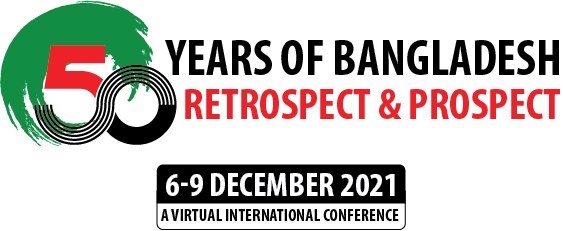
Session 2: STATE, SOCIETY, POLITICS
Monday, Dec 6, 2021 | 8:00pm – 9:45pm | Bangladesh Time (GMT+6)

Dr Mirza M Hassan
Head, the Governance and Politics Cluster, BIGD
Paper Title – Evolution of the State-Society Relations in Bangladesh: An Analytical Narrative
Abstract:
In this paper I attempt to provide an analytical narrative of the evolution of state-society relations in Bangladesh during the last five decades. To do this, I explore, very briefly, the changing nature of the relations between the political elites and other elites (military, business, administrative, professionals) as well as non-elites (popular classes—industrial workers, peasantry, and low income people engaged in formal and informal occupations). I also chart the evolution of different political orders over the decades by examining the nature of: the dominant party state during its ‘intermediate regime’ phase of the decade of early 70s, praetorian state of late 70s and 80s, alternate partyarchal monopolies of the 90s and early 2000s, and the dominant party state of the last and current decades. I argue that these political orders, through intermediations, largely informed the contingent evolution of the state-society relations, both synchronically and diachronically.
After providing such a brief but broad sweep of the evolution of the state-society relations, I present two case studies for an in-depth exploration of the dynamics of state-society relations. The first case study focuses on the evolving relations between the political elites and organized classes of business and labor during the last two decades. As empirical site, the first case will heavily rely on the RMG sector but not exclusively. This case also brings in the global political economy dimension (the politics of supply chain industry) that tends to overdetermine the state-business-labor relations, especially the nature of relevant regulatory regime and labors’ collective action. The second case examines the relations between the political elites and the amorphous popular classes, both in rural and urban settings, during the Covid-19 pandemic. This case specifically looks at the governance of lockdown and relief management. Utilizing the analytical lenses of social contract and performance legitimacy (as opposed to democratic legitimacy), the second case focuses on the nature of the dynamics of state-society relations as embedded in a political-economic-social structure characterized by generalized poverty and dysfunctional electoral democracy.
As a coda to the main analytical narrative I reflect, very briefly and provisionally, on the nature of sub-altern citizenship, the salience of positive liberty over negative liberty, and the dynamics and future trajectory of liberal democratic governance in Bangladesh.
 +(88 02) 55001185
+(88 02) 55001185 
